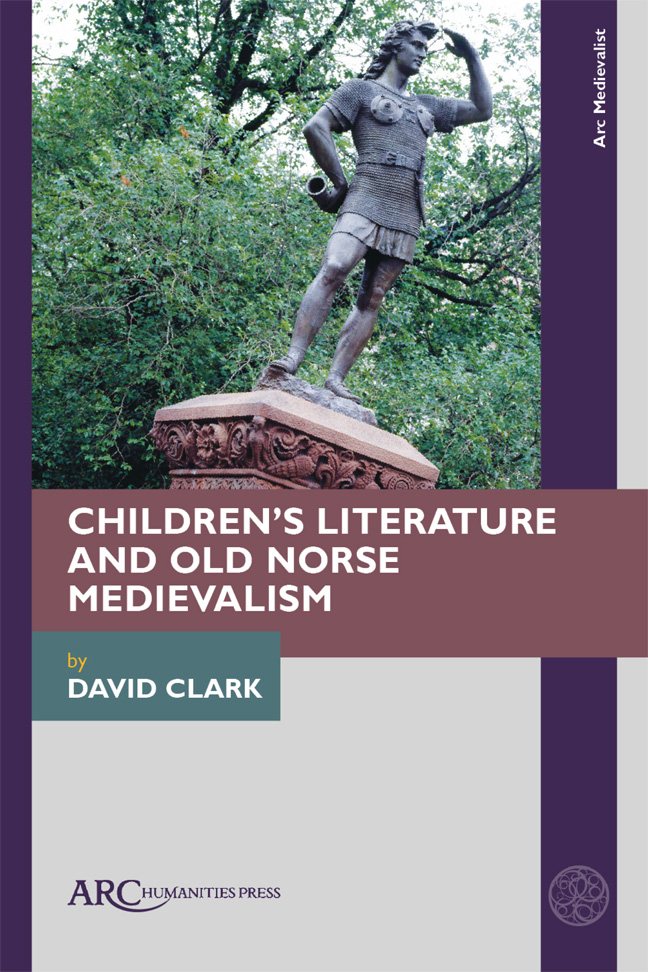Book contents
- Frontmatter
- Contents
- Acknowledgements
- Dedication
- Introduction: The End
- 1 Age-Related Categories
- 2 Generic Categories
- 3 Transformational Fantasy
- 4 Horned Helmets and Comic Anachronism
- 5 Viking Reputation
- 6 Runes and Magic
- 7 The Power of Story
- 8 Race and Ethnicity
- 9 Heroism
- 10 Viking Masculinity
- 11 Viking Femininity
- 12 Viking Sex and Gender
- 13 Bowdlerization
- 14 Sexuality
- 15 Ecological Threat
- 16 Norse Medievalism in Alan Early's Father of Lies Trilogy
- 17 Avoiding the End of Days: K. L. Armstrong and M. A. Marr's Blackwell Pages
- 18 Rick Riordan's Magnus Chase Series and Norse Medievalism
- Conclusion
- Select Bibliography of Frequently Cited Works
- Index
18 - Rick Riordan's Magnus Chase Series and Norse Medievalism
Published online by Cambridge University Press: 17 February 2024
- Frontmatter
- Contents
- Acknowledgements
- Dedication
- Introduction: The End
- 1 Age-Related Categories
- 2 Generic Categories
- 3 Transformational Fantasy
- 4 Horned Helmets and Comic Anachronism
- 5 Viking Reputation
- 6 Runes and Magic
- 7 The Power of Story
- 8 Race and Ethnicity
- 9 Heroism
- 10 Viking Masculinity
- 11 Viking Femininity
- 12 Viking Sex and Gender
- 13 Bowdlerization
- 14 Sexuality
- 15 Ecological Threat
- 16 Norse Medievalism in Alan Early's Father of Lies Trilogy
- 17 Avoiding the End of Days: K. L. Armstrong and M. A. Marr's Blackwell Pages
- 18 Rick Riordan's Magnus Chase Series and Norse Medievalism
- Conclusion
- Select Bibliography of Frequently Cited Works
- Index
Summary
RICK RIORDAN IS a prolific writer who has produced the bestselling YA series Percy Jackson, Heroes of Olympus, Kane Chronicles, and Trials of Apollo. The overall concept binding his several series (which overlap and exist in the same universe) is that the gods of myth and legend are real and have passed on some of their powers and abilities to their various part-human offspring, who may or may not be aware of their parentage. The main protagonist of each series is a teenage boy who is thrust into adventures and quests upon which the fate of the entire world rests, and whose perspective the reader is invited to share. Riordan's Magnus Chase series comprises Magnus Chase and the Sword of Summer (2015), The Hammer of Thor (2016), and The Ship of the Dead (2017).
Riordan's adoption of a focal character who is discovering his Norse heritage for the first time enables him to explain aspects of mythology of which many readers will be unaware, and to develop a convincing set of responses to the various characters and circumstances to which Magnus is exposed. The corollary, however, is that the reader cannot be sure if Riordan shares (and intends his readers to share) the attitudes of his protagonist or other characters, and this dynamic creates ambiguity around issues such as gender, sexuality, and ethnicity.
In this chapter, I consider the techniques and methods which Riordan employs in transforming Norse myth for a contemporary audience, predominantly through Magnus Chase and the Sword of Summer; in The Hammer of Thor, I explore his use of the Norse term argr to explore gender fluidity and trans identities in the character of Alex Fierro; finally, in The Ship of the Dead, I analyze Riordan's representation of ethnic and religious diversity through the character of Samirah al-Abbas.
Mythic Transformation in Magnus Chase and the Sword of Summer
In Sword of Summer, Riordan sets Magnus up as a flawed but relatable protagonist: a homeless teen from Boston who doesn't “need your sympathy. I’m used to being laughed at. I’m used to being ignored” (1.2). He is also a thief who (like another medievalist figure, Robin Hood) steals only from “obnoxious jerks who have too much already” (1.10). Magnus's distinctive sarcastic tone and use of the vernacular suits Riordan's irreverent take on his source material.
- Type
- Chapter
- Information
- Children's Literature and Old Norse Medievalism , pp. 161 - 184Publisher: Amsterdam University PressPrint publication year: 2023



